Top 10 Worst Parts of the Dark Ages
Okay, going from the Ice Age to the Dark Ages was actually an unintentional adaptation actually. It must have been in the back of my mind, though. Anyway, the Middle Ages were infamous for lots of reasons. But I did this list in March for a key reason: both have some madness, even if they're madness for completely different reasons.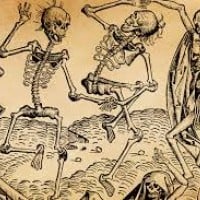
Let me set the stage for you: you remember when the coronavirus outbreak first came to be, right? Well, imagine what it would have been like if it were transmittable from animals to humans. In the Middle Ages, humans being roommates with rats was nothing to be surprised about, and that is how so many humans caught it: first from animals, and then they would infect their families and friends. The death toll of the black death was about one third of Europe. Other than human deaths, the most important thing the Black Death caused was an economic crash. It was worse than coronavirus and the Great Depression combined.
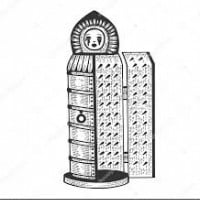
Torture is a common theme for the Dark Ages, and it was a form of punishment that was distributed to whoever didn't confess to a crime. Europe in the Middle Ages, even if the person being tortured was innocent. A torture device for example is the Iron Maiden, a metal chamber with holes in it. To sum it up, if you stood accused, you would be locked inside the Iron Maiden, and they would get asked questions through the holes. If the victim lets out the answer the interrogator was looking for, they would get let out. Unfortunately that was not a common outcome. And if they didn't, these metal poles start digging into the victim's skin. And that's just one example.
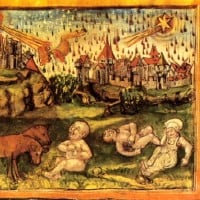
Europe was hit by a major famine around 1316, and the repercussions set the tone for the next decade.
The springs of years surrounding 1316 were strangely wet, which caused a steep decline in crops, and smaller harvests than we had anticipated. Many people starved to death or died died from hunger making their immune systems weak. Millions of people could not survive from hunger, diseases or both. This famine may have even caused the desperate to turn to cannibalism.
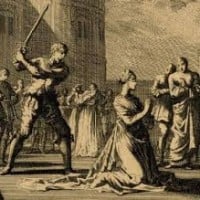
If I have anything positive to say about this, I have to hand it to the people of the time getting very creative with how they performed these executions. Some criminals, traitors, and innocent men were killed using the standard executions like an execution resembling using the guillotine, which was a painless death, other ways were brutal and inhumane, like "hanging, drawing, and quartering", a punishment for high treason. In this process, the criminal would be dragged along the ground by a horse to where they were to be killed, and they would then be hanged, close to death. Then they would get cut in four pieces, or "quartered".
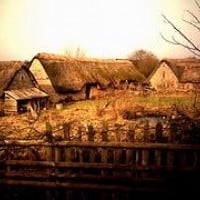
What often comes to mind when you say anything about the Medieval times would be a knights on their horses riding into the unknown, on behalf of the King, going far away. Truthfully, there definitely were plenty of knights and kings traveling around Europe, the life of your everyday villager didn't involve much travel. Documents from the Middle Ages say a good chunk of people not only didn't travel to other countries, but they rarely left their birthplace. And those who did explore a little bit probably didn't enjoy fighting off animals and freezing at night. Odds are you'd have a very boring life, but if you were one of the few exceptions who got to explore, it probably wasn't worth it.
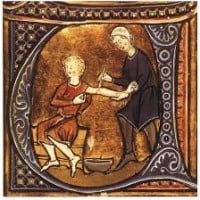
If you got the plague during the Middle Ages, doctors weren't as efficient and smart back then, as they are now, and more often than not, the doctor made things worse. Doctors in the Middle Ages viewed the human body through the four humors (phlegm, blood, yellow bile, and black bile) and they thought that being healthy was only possible through a proper balance of the two biles: blood, and phlegm. They also relied heavily on studying of the stars, known as astronomy, to try to make sense of why certain people had injuries or diseases, and they went to both the church, which was primarily Catholic back then, and they went to healing practice, to get a sense of what to do. Just to give you a good idea of what I'm talking about, the best way to treat mental illness was this thing called "trepanning", and drilling into a hole in the patient's skull, was how they took care of it. I don't know about you, but I'd rather take my chances with the mental illness.
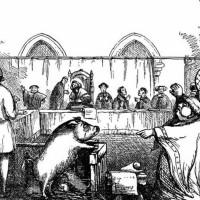
This is true! Wow. Animal trials were common public events in medieval and early modern Europe. Pigs, cows, goats, horses, and dogs that somehow broke the law were routinely subjected to the same legal proceedings as humans. In court, they were treated like humans. One question: how did they testify? They can't talk!
Seriously though, this is an extremely weird part.
I thought only humans were put on trial.
I doubt that many of them were found innocent.
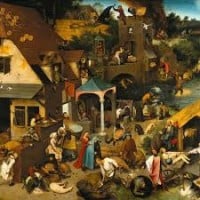
If this needed any further emphasis, it would easily be the fact that humans lived with rats. Bodies of water were used for dumping sewage and for a village's water supply to drink or bathe in. Diseases, besides the Black Death were nothing new, and given houses and other dwellings were already full, those diseases spread at a much quicker pace. And to make matters worse, little to no villagers knew the benefits of good hygiene, nobody had a good reason to clean their rivers, or find out why their citizens were getting all these diseases, while living what they thought must have been healthy lives.
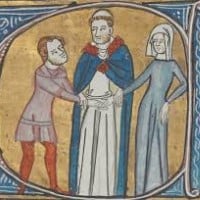
I never thought I'd say that there was a system for marriage, much less a more flawed one than in the present day, but history is an amazing thing. Royal marriages were detailed to be an amazing extravaganza, and a beautiful occasion. The joy of the two getting married was rarely, if ever, taken into consideration. Not to mention that once they got married, the royal couples struggled to prove it. If a couple wanted to get hitched, all they had to do was declare your relationship status as married. Good concept, at surface level, but I'm sure there were plenty of fakes who declared they were getting married, and it was really just a way for a man to get his kicks in.

Medieval society was seriously dumb. Like it should be the Dumb Ages. The King could force all his male peasants who were eighteen or older to join a war. It didn't matter if the opposition was an actual threat or if this was simply a rival kingdom. If you were picked, there was no backing out. If you were a male peasant of military age, working the fields could change to fighting wars quickly, but the worst part is how little being a warrior was in it for the peasants. Kings were more scared of the possibility if their peasants getting a little power, which is why peasants were required to bring their own weapons, so your most lethal weapons were pitchforks, shovels and whatnot. Nothing like today.
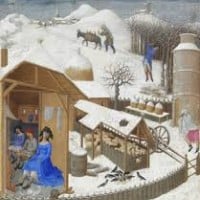
The 12th century was harsh. From around 1522 and afterwards, a Little Ice Age hit Europe. The average temperature tanked and many of the deaths caused in the Dark Ages were due to freezing to death. I believe it was around 15% of the English from that time period died freezing to death. The biggest problem didn't wasn't that, either.
Around 1317, England received large amounts of rain. It wasn't just depressing. It killed crops. Farmers' fields were always flooded, and it was an uphill battle to grow crops, and feed yourself and your family. The lack of crops made the prices skyrocket, and only the rich could buy food.
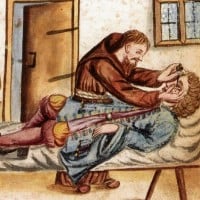
Actually, personal hygiene was actually better than we let on. It was more so their surroundings that were unsanitary.

Common misconception. Christian monks were in fact responsible for creating the modern university as well as preserving every bit of information they could find. Actually if you look at history they were the trailblazers of scientific progress. If they did discourage learning then this would be true, but that's not the case if you look how many Catholic clergies have dedicated themselves into science.
Actually, without Christianity, we wouldn't have things like the scientific method. The church established the first universities, and from them came great scholars and inventors.
I don't know about this one. Islam was spreading during the Middle Ages, but that's all I've got on that
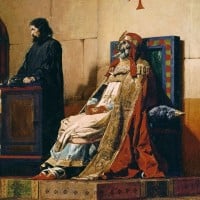
After the death of Arnulf and the collapse of Carolingian authority in Rome, Lambert entered the city and forced Stephen to convene the Cadaver Synod, both to re-assert his claim to the imperial crown and perhaps also to exact posthumous revenge upon Formosus.

Okay, yeah, that was bad, but in contrast with torture, a plague, and all that, there were worse things than sexists. Just saying. Not giving said sexists an endorsement.
Okay, prostitution was nothing new, in the Dark Ages. It's been around since before Christ, but the view on it in the Dark Ages is particularly disturbing. Prostitution was a considered a necessary evil in the the Dark Ages, because it was a means to curb men's lust. People felt that if prostitutes weren't available to men in cities, these men would find other disturbing ways to keep themselves entertained...